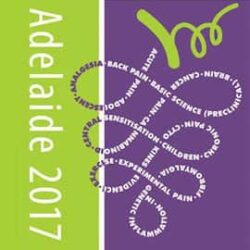APS 2017 – complete set of conference recordings
Price range: $149.00 through $299.00This product is a complete set of 32 sessions of the 2017 Australian Pain Society 37th Annual Scientific Meeting in the format of your choice.
Showing 1–16 of 33 resultsSorted by latest

This product is a complete set of 32 sessions of the 2017 Australian Pain Society 37th Annual Scientific Meeting in the format of your choice.

Mechanisms, assessment and management of chronic pancreatic pain Chair: Professor John Windsor, University of Auckland, NZ This topical session will describe the rationale for and development of an instrument to assess chronic pancreatic pain. It is hoped the instrument will enable improved assessment of pain and provide an indication of the underlying mechanisms driving the…

How to integrate current pain knowledge into clinical management of chronic pain Chair: A/Professor Julia Hush, Macquarie University Recent reports, both internationally and in Australia, have identified that one major impediment to adequate pain relief is patients’ limited access to clinicians who are knowledgeable about pain, owing in part to the prevalence of outmoded or…

Where and how much does it hurt? Making sense of spatial summation of pain Chair: Dr Mark Catley, University of South Australia, SA Chronic pain is frequently characterised by unexplained increases in pain. Experimental pain models, such as spatial summation paradigms, are used to better understand these symptoms. Substantial evidence from experimental pain research exists…

Perceived injustice after injury: Are compensation systems to blame, and what should we do about it? Chair: Dr Melita Giummarra, Monash University, VIC The health impacts of injury are frequently found to be worse when the injury was compensable, suggesting that the mechanism and severity of compensable injury and/or engagement with the compensation system have…

Pelvic Pain in Men Chair: Dr Susan Evans, Pelvic Pain SA, SA This topical session will be an interactive, case-based opportunity to explore the diagnosis and management of Male Chronic Pelvic Pain (CPP). Male CPP is often under-diagnosed and poorly managed. Men are often diagnosed with Chronic Prostatitis, but antibiotics fail to resolve their pain…

Pain and PTSD, shared suffering? Chair: Professor Alexander McFarlane, University of Adelaide, SA This topical session will highlight how PTSD has multiple somatic and cognitive manifestations that are not given sufficient attention in the diagnosis of the disorder. The shared neurobiology with pain and the immune dysregulation of the disorder need systematic assessment in accident…

Sleep and pain – A complex interaction Chair: Professor Paul Hodges, University of Queensland, QLD Pain and sleep interact in complex ways. We all know that pain interferes with sleep, but it is also becoming clear that sleep influences pain, through a variety of mechanisms. Understanding of this relationship is fundamental to treatment of pain….

Managing pain in the patient with an addiction disorder Chair: Professor Pam Macintyre, Royal Adelaide Hospital, SA When acute, cancer or chronic non-cancer pain occurs in a patient who has an addiction to opioids or other substances, its management can present a complex clinical challenge to the health care provider(s) and also act as a…

Explain pain better: Recent updates in the science of conceptual change Chair: Professor Lorimer Moseley, University of South Australia, SA This topical symposium will focus on innovation and current practice by presenting how developments from outside the pain field have recently been integrated into clinical pain practice. There will be three presentations, each focussing on…

Fundamentals of neuroimaging for the investigation of pain Chair: A/Professor Michael Farrell, Monash University, VIC Neuroimaging techniques are frequently used to measure changes in brain structure and function associated with pain processing in humans. In particular, functional brain imaging studies frequently appear in the scientific literature, and have contributed substantially to our understanding of pain…

Randomised clinical trial data outcomes in neuromodulation Chair: Dr Richard Sullivan, Precision Brain, Spine and Pain Centre, VIC Recent pivotal studies (rated Level 1 CTF) in the US investigating efficacy of newer neuromodulation techniques have demonstrated substantial improvements in pain (50% or greater reduction in 70-80% of subjects sustained to 2 years post implant) and…

Pain and opioid management in primary care Chair: Dr Simon Holliday, Albert St Medical Centre Taree, NSW While everybody agrees there should be better communication between the tertiary pain sector and Primary Care, do the two sectors understand the context in which this occurs? Three general practitioners reflect on some limitations and potentials for pain…

Prognostic screening tools for musculoskeletal pain conditions: development, application and clinical value Chair: Emma Karran, University of South Australia, SA Stratified approaches to health care delivery – which aim to match patients to the most appropriate care pathways – are gaining popularity for their potential to optimise treatment benefits and maximise care efficiency. A common…

Evolution of pain perception Chair: A/Professor Greg Neely, University of Sydney, NSW Recent discoveries in the pain field and elsewhere have demonstrated the exquisite conservation of gene function over hundreds of millions of years of evolution, and across virtually all taxonomies in life. In this session we will focus on pain perception from an evolutionary…

Neuromodulation – The Science, The Evidence and the Application in Multidisciplinary Pain Management Chair: Dr Matthew Green, Pain Medicine of South Australia, SA Neuromodulation has been helping people suffering from chronic neuropathic pain for close to 50 years. As science and medicine work hand in hand to understand the mechanisms of pain, new advancements are…